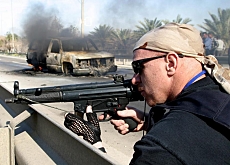Swiss Blackwater “mercenary” investigated

Switzerland's military justice is investigating a Swiss citizen who worked for the controversial US security firm Blackwater in Iraq.
The authorities are looking into whether the man broke a law that bars the Swiss from working for foreign military services, an official said on Tuesday.
The United Nations has called the use of private security guards by companies such as Blackwater, which was involved in the killing of 17 civilians in Baghdad in September, a growing new form of mercenary activity, which is discouraged in international rules on the conduct of war.
The United States rejects the notion that government-contracted security guards, of whatever nationality, are mercenaries. Blackwater says its guards acted lawfully after being shot at, but the Iraqi government says the guards “deliberately killed” the 17 people.
Switzerland started its probe in May, said Frank Zellweger, spokesman for the Swiss military justice system.
If the judiciary rules that employment for Blackwater constitutes military service, the man – referred to by Swiss television only as “Mike” – could receive a prison term of up to three years or a fine. He declined to identify the Swiss national, citing the country’s strict privacy rules.
Switzerland, which was famous in the Middle Ages for sending mercenaries throughout Europe, strictly prohibits service in a foreign military.
Blackwater would only face criminal sanctions if it was found to have actively targeted Swiss citizens for military recruitment, Zellweger said.
But he confirmed details of the investigation, reported by the Zurich Tages-Anzeiger newspaper, that judicial authorities were alerted to the case by a television report in May about how the man had worked in Iraq and had since applied to join the French Foreign Legion.
Zellweger said the man had since confirmed to authorities what Swiss television reported.
Legal grey area
Switzerland has yet to rule on whether employment for a private security firm in a war zone constitutes mercenary activity.
Tages-Anzeiger reported that military justice officials have asked Swiss intelligence to aid the investigation by determining how Blackwater is contracted and what weapons the firm uses in Iraq. The paper said the man is not accused of war crimes.
Last week UN Secretary-General Ban Ki-moon called for private security companies operating in war zones to be held more accountable.
Ban’s report to the UN Security Council said that as of March 2006, there were an estimated 181 private military security companies in Iraq with 48,000 employees involved in activities that frequently bring them into direct contact with civilians.

More
International Humanitarian Law
History
Switzerland strictly forbids its citizens from serving in a foreign military service.
It has previously focused on Swiss dual-citizens serving in the armies of countries where they also hold passports and nationals serving in the Foreign Legion.
Zellweger said the federal government granted an exception in 1929 to the Swiss Guard members who have protected the Vatican and Roman Catholic popes for the last five centuries.
Under international law, the hiring of foreign soldiers by one country for use in another is barred only for the 30 nations that ratified a 1989 treaty against the practice.
The US and Iraq are among the many states that did not sign.
The UN report that criticised Blackwater and other security firms in Iraq will be presented to the General Assembly in New York later this week, said Jose Diaz, a spokesman for UN human rights chief Louise Arbour.
swissinfo with agencies
An estimated two million Swiss mercenaries served in foreign armies between the 14th and 19th centuries.
Under Swiss law, mercenary duties were outlawed in 1927 (in addition to a ban according to the 1848 constitution), except for members of the Swiss Papal Guards.
About 800 Swiss citizens fought for the Republicans during the Spanish Civil War.
An estimated 40,000 Swiss have also served in the French Foreign Legion since 1831.
Blackwater is one of the biggest security contractors in Iraq. It employs more than 1,000 people there and is responsible for guarding US diplomats and Embassy security.
Its distinctive small black helicopters hover above Baghdad and its armed vehicles shadow convoys of senior officials through the city’s streets.
As well as Iraq, it operates in Afghanistan and has also had domestic contracts, such as guarding and policing New Orleans after Hurricane Katrina.
Salaries – reportedly as high as $1,000 (SFr1,150) a day – attract troops and ex-Special Forces personnel from countries such as Bosnia, the Philippines, Israel and Chile. Tens of thousands have streamed in since the US-led invasion in 2003.
They have duties once performed by armed forces such as airport and border security. Other contractors cook soldiers’ meals, do their laundry and drive truck convoys.
At least 647 contractors were killed between March 1, 2003, and September 30, 2006.

In compliance with the JTI standards
More: SWI swissinfo.ch certified by the Journalism Trust Initiative











You can find an overview of ongoing debates with our journalists here . Please join us!
If you want to start a conversation about a topic raised in this article or want to report factual errors, email us at english@swissinfo.ch.